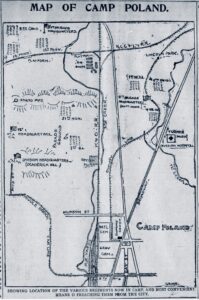The soldiers of the 3rd North Carolina Regiment had had their fill of Knoxville. It’s likely the volunteers from the 2nd Ohio concurred. On October 3, 1898, a contingent of about 600 combined from each had been busy laying water pipes for a new camp on Middlebrook Pike.
On October 5, a copy of a letter sent to U.S. Secretary of War Russell Alger was shared with the The Knoxville Journal & Chronicle. The gist of it was simple: these soldiers volunteered to go to war, they did not sign up for grunt duty far from the action, and since this fracas is pretty much wrapped up with no battle glory to be had, could he see fit to muster them out and return them to their wives and families? Additionally, the $15.60 a month wasn’t helping much so far from home, and there were jobs, farms and professions that needed returning to:

Rudimentary map of Camp Poland from the Knoxville Sentinel, August 8, 1898.
We have to drill harder than any other regiment on the grounds and after drilling so hard, we have to work so hard. We have to cut ditches, sink holes and fill up gullies, put in water pipes. We, the 3rd N.C. regiment soldiers has (sic) not had but one pair of pants, one coat, two undershirts, one top shirt. We are in a box fit. Our food is not fit to eat, and oh my dear sir, we are bound up in a little place about 400 feet long 3 feet wide. Just think of the confinement we are under just because we volunteered freely to fight for our country. We the undersigned many soldiers did not volunteer for garrison duty and we do not think that our honorable government will take the advantage of willing and faithful men who came to the rescue of the flag, stars and stripes.
The fracas in question was the Spanish American War, prompted by the im/explosion of the U.S.S. Maine in Havana Harbor, Cuba, in late April that same year. One would not immediately think of Knoxville as a hotbed of military preparedness for a war primarily fought on the water. As it was, Camp Thomas, Georgia, on the Chickamauga Battlefield was being used a training ground for up to 70,000 troops. Problem was, over the course of about three months, the camp was overrun with typhoid fever. As the death toll rose, so did reports of scandalous mismanagement.
Other locations were needed to house and train the troops encamped there as well as provide hospital services, and Knoxville was chosen. Originally called Camp Wilder, regiments from several states moved to Camp Poland in North Knox County. It was spread out in pockets from Old Gray Cemetery north along Broadway and Central to Lincoln Park as well as west into Lonsdale near the Coster Shops and areas now covered by I-275. Other regiments spread out in the shadow of Sharp’s Ridge included the 1st Pennsylvania, 14th Minnesota, 31st Michigan, 1st West Virginia, 58th Indiana, 1st Georgia and 6th Ohio. There were from everywhere.
Proximity to First Creek and Second Creek as well as access to rail lines not too far from the center city but in less densely populated areas no doubt informed the choice of location. Reports from the time mention the Old Dummy Line station that ran from near Old Gray into Fountain City. Others noted that a soldier from the 1st West Virginia was found dead near the Ohio Guard line, having been under arrest and escaped from the guard house. A member for the 4th Tennessee was shot and killed by the provost guard while under arrest in the Bowery District (what we now call the Old City). Both those incidents happened while Secretary Alger was in town to review the camps and troops on September 22.
The war was pretty much over by the time those North Carolina soldiers sent their plaintive letter to Alger. They were moved to the new camp on Middlebrook by mid-October. The Treaty of Paris of 1898 was signed on December 10 and hostilities officially ceased. The camp was closed in January 1899 except for its hospital which remained open another month.
Beth Kinnane writes a history feature for KnoxTNToday.com. It’s published each Tuesday and is one of our best-read features.
Sources: Knoxville Journal/Chronicle digital archives, Knoxville News Sentinel digital archives¸ Tennessee Encyclopedia, McClung Historical Collection digital archives, Ohio Memory Collection digital archives


